
- Average Rating:
- Not yet rated
- Topic Areas:
- Topical Panels | Therapeutic Relationship | Therapist Development | Psychotherapy
- Categories:
- Evolution of Psychotherapy | Evolution of Psychotherapy 1995
- Faculty:
- William Glasser, MD | Lynn Hoffman, ACSW | Ernest Rossi, PhD | Joseph Wolpe, M.D.
- Duration:
- 54 Minutes
- Format:
- Audio Only
- Original Program Date:
- Dec 16, 1995
- Short Description:
- Panel 14 from the Evolution of Psychotherapy 1995 - Role of the Therapist / Role of the Client Featuring William Glasser, M.D.; Lynn Hoffman, A.C.S.W.; Ernest Rossi, Ph.D.; and Joseph Wolpe, M.D. Moderated by Betty Alice Erickson, MS.
- Price:
- $15.00 - Base Price
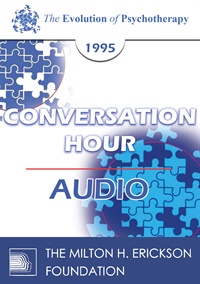
- Average Rating:
- Not yet rated
- Topic Areas:
- Conversation Hours | Psychotherapy
- Categories:
- Evolution of Psychotherapy | Evolution of Psychotherapy 1995
- Faculty:
- Joseph Wolpe, M.D.
- Duration:
- 55 Minutes
- Format:
- Audio Only
- Original Program Date:
- Dec 15, 1995
- Short Description:
- Conversation Hour 08 from the Evolution of Psychotherapy 1995 - Joseph Wolpe, MD
- Price:
- $15.00 - Base Price
Tags: Joseph Wolpe Psychotherapy

- Average Rating:
- Not yet rated
- Topic Areas:
- Topical Panels | Psychotherapy | Therapist Development | Training
- Categories:
- Evolution of Psychotherapy | Evolution of Psychotherapy 1995
- Faculty:
- Mary Goulding, MSW | James F. Masterson, MD | Joseph Wolpe, M.D. | Jeffrey Zeig, PhD
- Course Levels:
- Master Degree or Higher in Health-Related Field
- Duration:
- 1:03:57
- Format:
- Audio Only
- Original Program Date:
- Dec 15, 1995
- Short Description:
- A panel of experts discuss their viewpoints on the given topic.
- Price:
- $15.00 - Base Price

- Average Rating:
- Not yet rated
- Topic Areas:
- Invited Addresses | Psychoanalysis | Anxiety | Psychotherapy | Research
- Categories:
- Evolution of Psychotherapy | Evolution of Psychotherapy 1995
- Faculty:
- Albert Ellis, PhD | Joseph Wolpe, M.D.
- Duration:
- 1:31:10
- Format:
- Audio Only
- Original Program Date:
- Dec 14, 1995
- Short Description:
- In the early decades of the 20th century Freud's mastery of the craft of presenting a case enthroned a belief that anxiety disorders were caused by repressed emotional complexes and that recovery required the restitution of repressed ideas. This belief dominated psychotherapeutic practice, and even though little was to be seen in the way of success, any alternative was treated with scorn. Mid-century studies of experimental neuroses showed that these disturbances were the consequence of the learning of maladaptive anxiety and could be overcome by systematic counteraction by other emotions.
- Price:
- $15.00 - Base Price
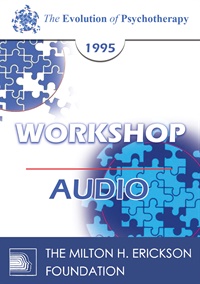
- Average Rating:
- Not yet rated
- Topic Areas:
- Workshops | Anxiety | Psychotherapy
- Categories:
- Evolution of Psychotherapy | Evolution of Psychotherapy 1995
- Faculty:
- Joseph Wolpe, M.D.
- Duration:
- 2 Hours 28 Minutes
- Format:
- Audio Only
- Original Program Date:
- Dec 13, 1995
- Short Description:
- Seminal laboratory experiments show how habits are unlearned. Behavioral analysis: Accurately identify fear eliciting stimulus patterns. Description of major techniques with case examples, e.g., systematic desensitization, flooding, assertiveness training. Practica involving attendees showing treatment of specific anxiety constellations will reveal how the therapist adjusts to the individual.
- Price:
- $15.00 - Base Price
Tags: Anxiety Joseph Wolpe Psychotherapy

- Average Rating:
- Not yet rated
- Topic Areas:
- Clinical Presentations | Psychotherapy | Therapist Development | Treatment Planning
- Categories:
- Evolution of Psychotherapy | Evolution of Psychotherapy 1990
- Faculty:
- Joseph Wolpe, M.D.
- Duration:
- 52 Minutes
- Format:
- Audio Only
- Original Program Date:
- Dec 15, 1990
- Short Description:
- Educational Objectives: To learn the technique of behavioral data-gathering To understand how data is analyzed to reveal case dynamics and pointers to treatment
- Price:
- $15.00 - Base Price
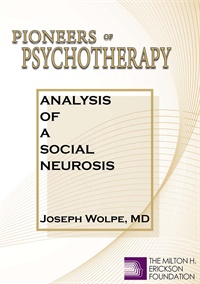
- Average Rating:
- Not yet rated
- Topic Areas:
- Clinical Demonstrations | Psychotherapy | Trauma | Aging and Mortality
- Bundle(s):
- Pioneers of Psychotherapy Bundle
- Categories:
- Pioneers of Psychotherapy | Evolution of Psychotherapy | Evolution of Psychotherapy 1990
- Faculty:
- Joseph Wolpe, M.D.
- Course Levels:
- Master Degree or Higher in Health-Related Field
- Duration:
- 00:56:00
- Format:
- Audio and Video
- Original Program Date:
- Dec 14, 1990
- Short Description:
- Joseph Wolpe (1990) interviews police officer Tom, who has problems resulting from a traumatic event: he had been confronted by a violent man whom he shot and killed. Later it became evident that the man had an empty gun and was mentally ill. Following a thorough interview, Wolpe uses eye movement and systematic desensitization to diminish the established fear hierarchy.
- Price:
- $59.00 - Base Price
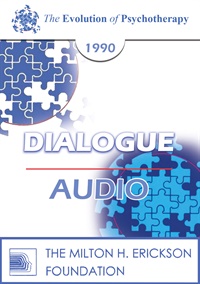
- Average Rating:
- Not yet rated
- Topic Areas:
- Dialogues | Goals of the Therapist | Psychotherapy | Therapist Development
- Categories:
- Evolution of Psychotherapy | Evolution of Psychotherapy 1990
- Faculty:
- Judd Marmor | Joseph Wolpe, M.D.
- Duration:
- 59 Minutes
- Format:
- Audio Only
- Original Program Date:
- Dec 14, 1990
- Short Description:
- Dialogue 05 from the Evolution of Psychotherapy 1990 - The Goals of Psychotherapy, featuring Judd Marmor, MD, PhD, and Thomas Szasz, MD. Moderated by Michael Yapko, PhD.
- Price:
- $15.00 - Base Price

- Average Rating:
- Not yet rated
- Topic Areas:
- Invited Addresses | Depression | Psychotherapy | Therapist Development
- Categories:
- Evolution of Psychotherapy | Evolution of Psychotherapy 1990
- Faculty:
- Joseph Wolpe, M.D. | Thomas Szasz, MD
- Duration:
- 1:24:43
- Format:
- Audio Only
- Original Program Date:
- Dec 14, 1990
- Short Description:
- Accepted thinking about non-polar, non-psychotic depression has been impaired by ignoring crucial research. This shows that some cases are masked endogenous depression; others are anxiety-based in several ways. Therefore, each case must be investigated to decide appropriate treatment and thus surpass the mediocre results typified in the "Collaborative Study."
- Price:
- $15.00 - Base Price
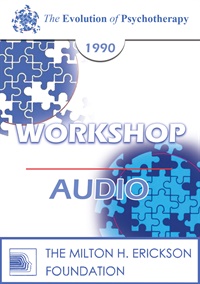
- Average Rating:
- Not yet rated
- Topic Areas:
- Workshops | Anxiety | Phobia | Panic | Psychotherapy
- Categories:
- Evolution of Psychotherapy | Evolution of Psychotherapy 1990
- Faculty:
- Joseph Wolpe, M.D.
- Duration:
- 3 Hours 35 Minutes
- Format:
- Audio Only
- Original Program Date:
- Dec 13, 1990
- Short Description:
- Social anxieties are the most common constituent of neuroses. Their different dynamics in a spectrum of cases will be described, and their role in agoraphobia and panic disorder will be presented. It will be seen how treatments, dictated by dynamics revealed in case analyses, are correspondingly successful.
- Price:
- $15.00 - Base Price
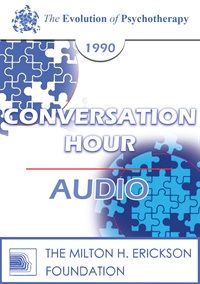
- Average Rating:
- Not yet rated
- Topic Areas:
- Conversation Hours | Psychotherapy
- Categories:
- Evolution of Psychotherapy | Evolution of Psychotherapy 1990
- Faculty:
- Joseph Wolpe, M.D.
- Duration:
- 1 Hour 1 Minutes
- Format:
- Audio Only
- Original Program Date:
- Dec 12, 1990
- Short Description:
- Conversation Hour 3 from the Evolution of Psychotherapy 1990, featuring Joseph Wolpe, MD.
- Price:
- $15.00 - Base Price
Tags: Joseph Wolpe Psychotherapy
- Average Rating:
- Not yet rated
- Topic Areas:
- Conversation Hours | Psychotherapy
- Categories:
- Evolution of Psychotherapy | Evolution of Psychotherapy 1985
- Faculty:
- Joseph Wolpe, M.D.
- Course Levels:
- Master Degree or Higher in Health-Related Field
- Duration:
- 1:02:45
- Format:
- Audio and Video
- Original Program Date:
- Dec 14, 1985
- Short Description:
- Conversation Hour 16 featuring Joseph Wolpe, MD.
- Price:
-
Sale is $29.00
price reduced from Base Price - $59.00
Tags: Psychotherapy Joseph Wolpe

- Average Rating:
- Not yet rated
- Topic Areas:
- Invited Addresses | Psychotherapy
- Categories:
- Evolution of Psychotherapy | Evolution of Psychotherapy 1985
- Faculty:
- Joseph Wolpe, M.D. | Judd Marmor
- Duration:
- 1 Hour 22 Minutes
- Format:
- Audio Only
- Original Program Date:
- Dec 13, 1985
- Short Description:
- Invited Address Session 8 - Part 1 - The Promotion of Scientific Psychotherapy: A Long Voyage featuring Joseph Wolpe, MD. With discussant Judd Marmor, MD. Moderated by Harold Arkowitz, PhD.
- Price:
- $15.00 - Base Price
Tags: Joseph Wolpe Psychotherapy
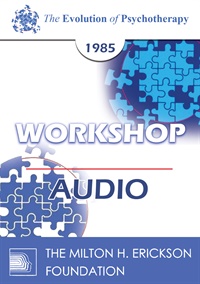
- Average Rating:
- Not yet rated
- Topic Areas:
- Workshops | Psychotherapy | Therapist Development
- Categories:
- Evolution of Psychotherapy | Evolution of Psychotherapy 1985
- Faculty:
- Joseph Wolpe, M.D.
- Duration:
- 2 Hours 48 Minutes
- Format:
- Audio Only
- Original Program Date:
- Dec 12, 1985
- Short Description:
- This will be an opportunity to make behavior analyses of well-studied cases of attendees with directions, if feasible, for behavioral treatment.
- Price:
- $15.00 - Base Price
- Average Rating:
- Not yet rated
- Topic Areas:
- Clinical Presentations | Anxiety | Psychotherapy
- Categories:
- Evolution of Psychotherapy | Evolution of Psychotherapy 1985
- Faculty:
- Joseph Wolpe, M.D.
- Course Levels:
- Master Degree or Higher in Health-Related Field
- Duration:
- 54:21
- Format:
- Audio and Video
- Original Program Date:
- Dec 11, 1985
- Short Description:
- Clinical Presentation 03 - A Case of Social Anxiety featuring Joseph Wolpe, MD.
- Price:
- $59.00 - Base Price
Tags: Anxiety Psychotherapy Joseph Wolpe
- Average Rating:
- Not yet rated
- Topic Areas:
- Topical Panels | Psychotherapy | Research
- Categories:
- Evolution of Psychotherapy | Evolution of Psychotherapy 1985
- Faculty:
- Aaron Beck, MD | James Bugental, PhD | Ernest Rossi, PhD | Joseph Wolpe, M.D.
- Course Levels:
- Master Degree or Higher in Health-Related Field
- Duration:
- 1:02:15
- Format:
- Audio and Video
- Original Program Date:
- Dec 11, 1985
- Short Description:
- Topical Panel 04 on Psychotherapy Research, featuring Aaron T Beck, MD, James FT Bugental, PhD, Ernest L Rossi, PhD, and Joseph Wolpe, MD. Moderated by Larry E Beutler, PhD.
- Price:
-
Sale is $29.00
price reduced from Base Price - $59.00




